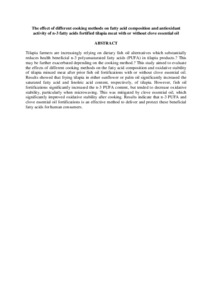Citation
Ramezani, Fard E. and Romano, N. and Goh, Y. M. and Oskoueian, E. and Ehteshami, Fariborz and Ebrahimi, M.
(2015)
The effect of different cooking methods on fatty acid composition and antioxidant activity of n-3 fatty acids fortified tilapia meat with or without clove essential oil.
Journal of Environmental Biology, 37 (4).
pp. 775-784.
ISSN 0254-8704; ESSN: 2394-0379
Abstract
Tilapia farmers are increasingly relying on dietary fish oil alternatives which substantially reduces health beneficial n-3 polyunsaturated fatty acids (PUFA) in tilapia products.? This may be further exacerbated depending on the cooking method.? This study aimed to evaluate the effects of different cooking methods on the fatty acid composition and oxidative stability of tilapia minced meat after prior fish oil fortifications with or without clove essential oil. Results showed that frying tilapia in either sunflower or palm oil significantly increased the saturated fatty acid and linoleic acid content, respectively, of tilapia. However, fish oil fortifications significantly increased the n-3 PUFA content, but tended to decrease oxidative stability, particularly when microwaving. This was mitigated by clove essential oil, which significantly improved oxidative stability after cooking. Results indicate that n-3 PUFA and clove essential oil fortifications is an effective method to deliver and protect these beneficial fatty acids for human consumers.
Download File
![[img]](http://psasir.upm.edu.my/46550/1.hassmallThumbnailVersion/The%20effect%20of%20different%20cooking%20methods%20on%20fatty%20acid%20composition%20and%20antioxidant%20activity%20of%20n-3%20fatty%20acids%20fortified%20tilapia%20meat%20with%20or%20without%20clove%20essential%20oil.pdf)  Preview |
|
Text (Abstract)
The effect of different cooking methods on fatty acid composition and antioxidant activity of n-3 fatty acids fortified tilapia meat with or without clove essential oil.pdf
Download (5kB)
| Preview
|
|
Additional Metadata
Actions (login required)
 |
View Item |

